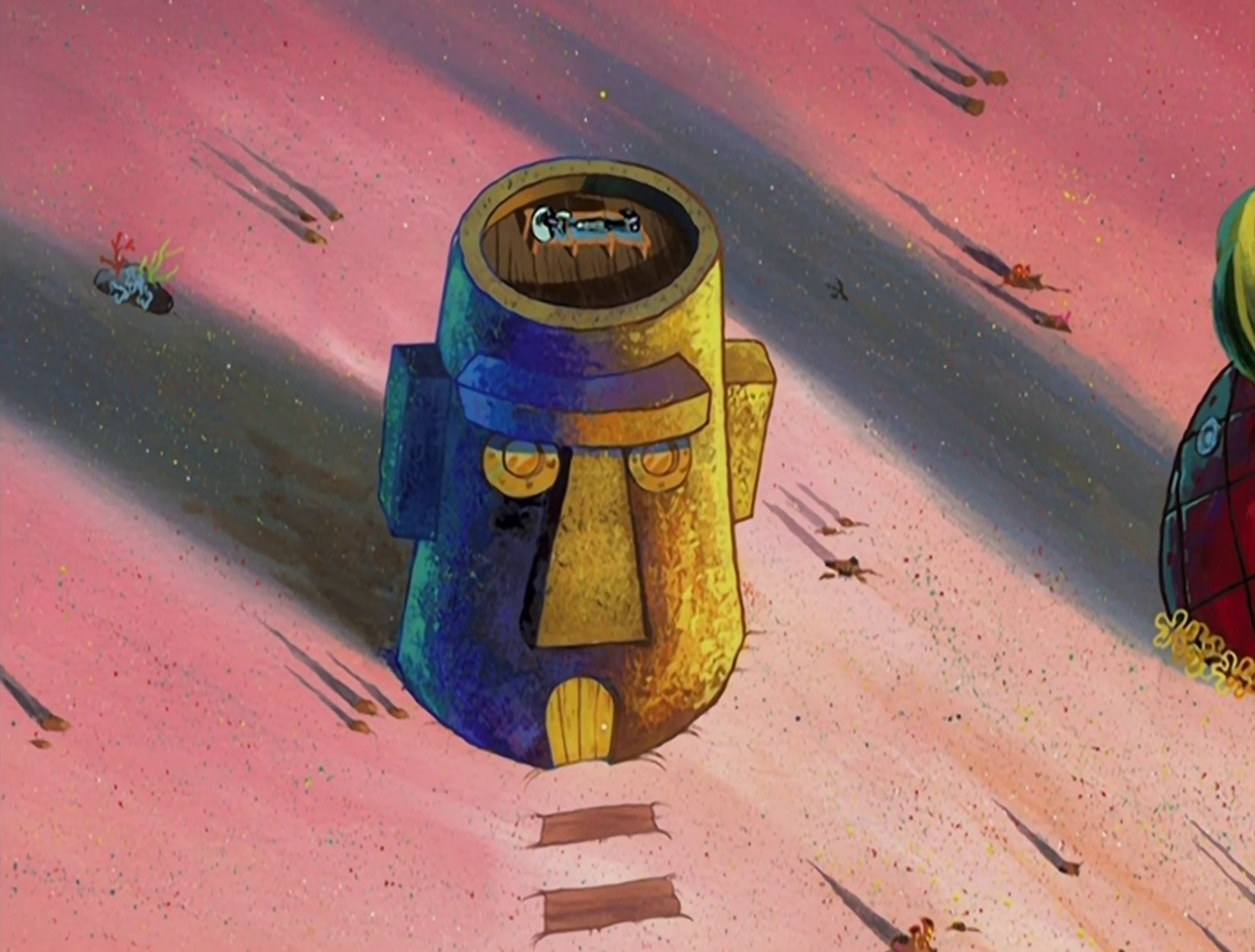Part 1: Caught in the Patty Vault
Who else feels attacked when they see this face?

I keep hearing that you only understand Squidward when you grow up: as a kid you identified with SpongeBob because you used to be like him (a happy innocent creative playful silly childlike haver of fun), and then you got old and crusty and turned into Squidward (a boring nasty cynical anguished self-defeating narcissistic grump). The general idea gets spelled out pretty well in this video essay, and you can see people repeating the thesis in just about every YouTube comment on every Squidward video.
But I saw the show as a kid, and I remember identifying with Squidward. When he was frustrated, I was frustrated; when he was embarrassed, I was embarrassed. I remember a hostile universe that was set up fully against Squidward. The poor guy was just stuck in despair at the bottom of the sea, playing his clarinet, badly, forever. That's how I saw it. How could you possibly identify with SpongeBob?
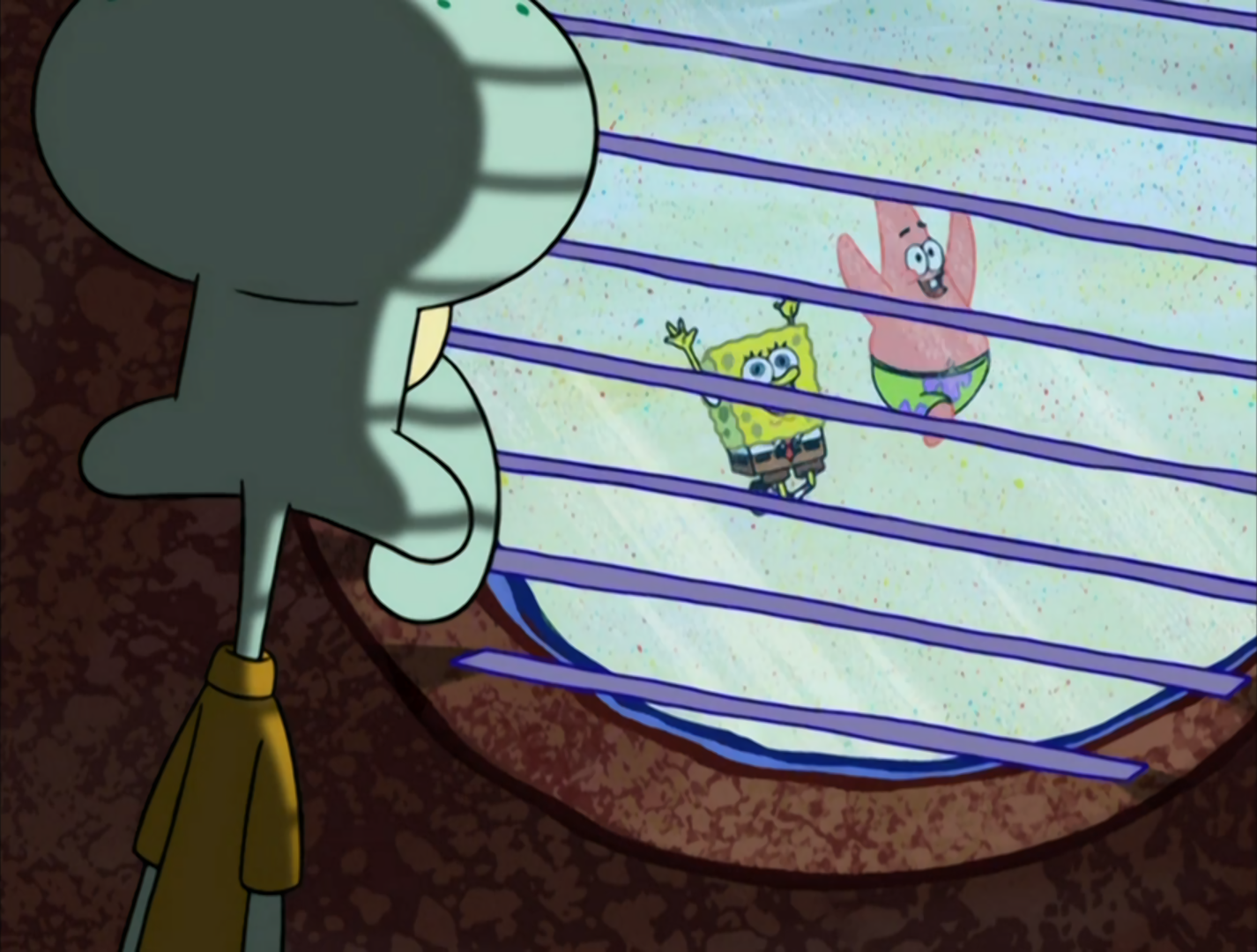
Let me be precise. I don't mean identifying with SpongeBob in general—of course you could relate to SpongeBob in those episodes when he deals with procrastination, or flunks his driver's exam, or forgets how to tie his shoes. I mean that I find it hard to see how you could relate to SpongeBob in his role in Squidward's life. In the classic episodes about the dynamic between SpongeBob and Squidward, SpongeBob comes off as an intrusive nuisance, a weird alien, a smiling monster—-not as somebody you could be.
The Squidward episodes I remembered most clearly were “Idiot Box” (the one where SpongeBob and Patrick play with their imagination and make impossibly real noises whenever Squidward isn't looking), “Just One Bite” (the one where Squidward tries a Krabby Patty for the first time), and “Artist Unknown” (the one where Squidward tries to teach SpongeBob the rules of art, but SpongeBob is naturally perfect at it). Looking back on these episodes, I remembered a very anti-rational, anti-snobbish, aggressively populist worldview—one that says, “Everyone who claims to be sophisticated is full of shit and denying their sense of fun. Look at SpongeBob. You would be talented like him if you just let go of your ego and stopped trying to live by all these pompous, made-up, adult rules. You should be a SpongeBob and not a Squidward.“
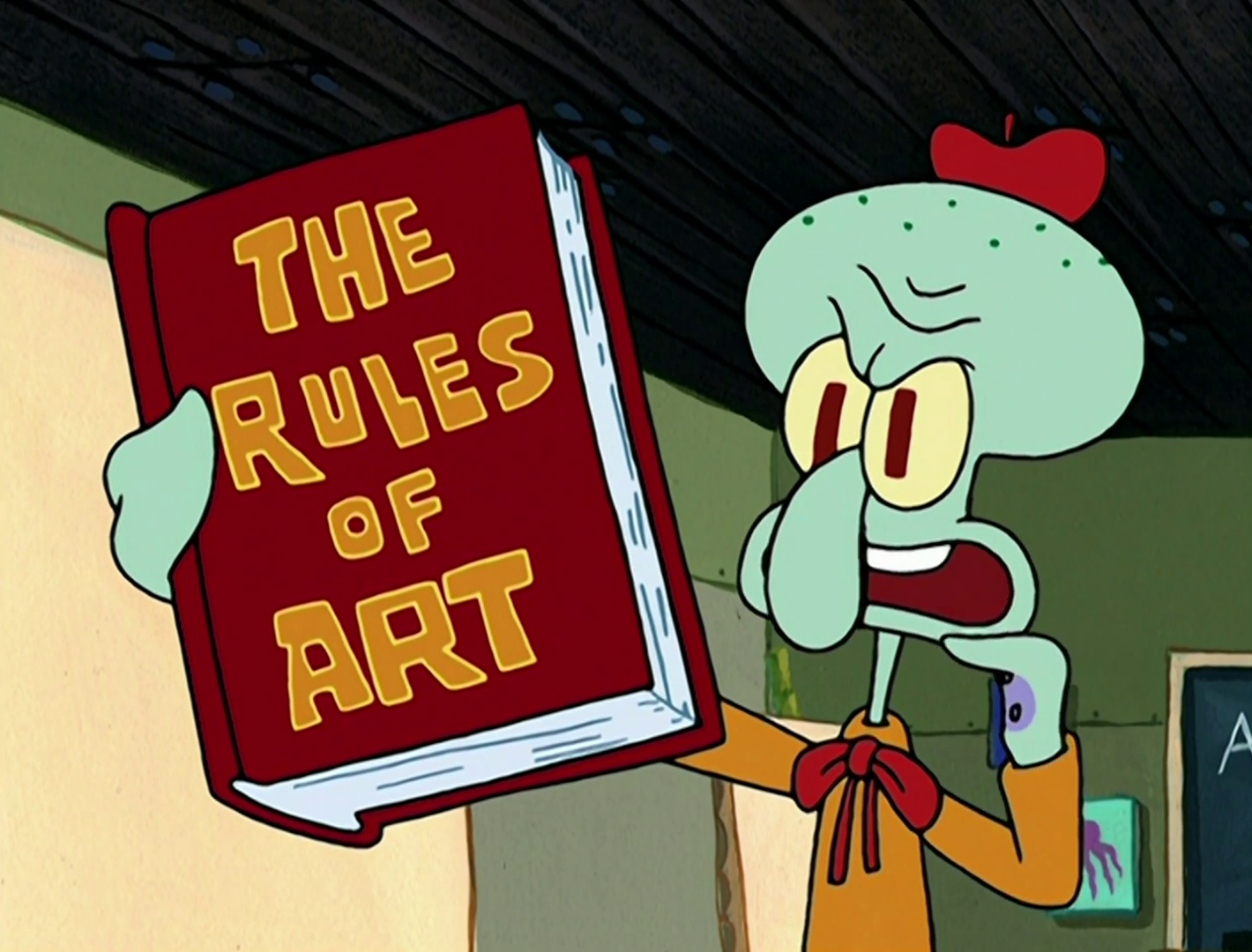
Well, that was the impression I had, looking back on the show. but I hadn't seen SpongeBob in a long time. So in early 2020 quarantine, I rewatched a whole lot of Squidward episodes from the first three seasons—all the ones I remembered, some I had forgotten, and some I had never heard of. I wanted to see if they really had the message I thought they had, or if I had just been projecting my insecurities on the show retroactively. Well—it turns out I had it completely backwards!
Each of these Squidward episodes is a caricature of Squidward's predicament. It's not that the show's message is “Fuck you, Squidward, for being a Squidward”—it's that when you're in Squidward's place, the universe seems to be saying that. The show isn't saying that talent and creativity belong to childlike innocent happy fun people—it's saying that from Squidward's position, happy talented people look like these smiling monsters. It's not saying people are permanently in one category or the other, SpongeBob or Squidward—it's describing the delusion that makes you essentialize people into SpongeBobs and Squidwards. I'm not saying the cartoon has to be a real description of anything; I'm saying it articulates the fantasies and delusions involved in a deeply unhealthy relationship with talent and ego.

Watching these episodes, I noticed a pretty common pattern:
- Squidward tries to enjoy himself, but he gets interrupted by the intrusion of SpongeBob (and maybe Patrick).
- SpongeBob shows off some kind of incomprehensible magic (an object or talent), which Squidward outwardly rejects.
- SpongeBob takes Squidward’s rejection seriously, while Squidward becomes obsessed with the magic.
- Squidward gives in to secret desire and tries to get the magic himself, often in private. SpongeBob catches Squidward in the act.
- Squidward goes overboard somehow and gets punished by fate.
I see this as the basic pattern of these episodes: Bubblestand, The Paper, Artist Unknown, Just One Bite, Idiot Box, and Club SpongeBob.
Each one of them has an unattainable object—some kind of locus of the fun that Squidward doesn't want to have, then wants to have, then can't have, then gets punished for seeking. Sometimes it's a physical object (the paper, the Krabby Patty), and other times it just seems to be an incomprehensible talent (drawing a perfect circle, blowing elephant bubbles). “Club SpongeBob” actually has two copies of this pattern, with two such objects: first the unattainable thing is club membership, and then it's the magic conch, a pull-string toy that gives vague commands to be obeyed.
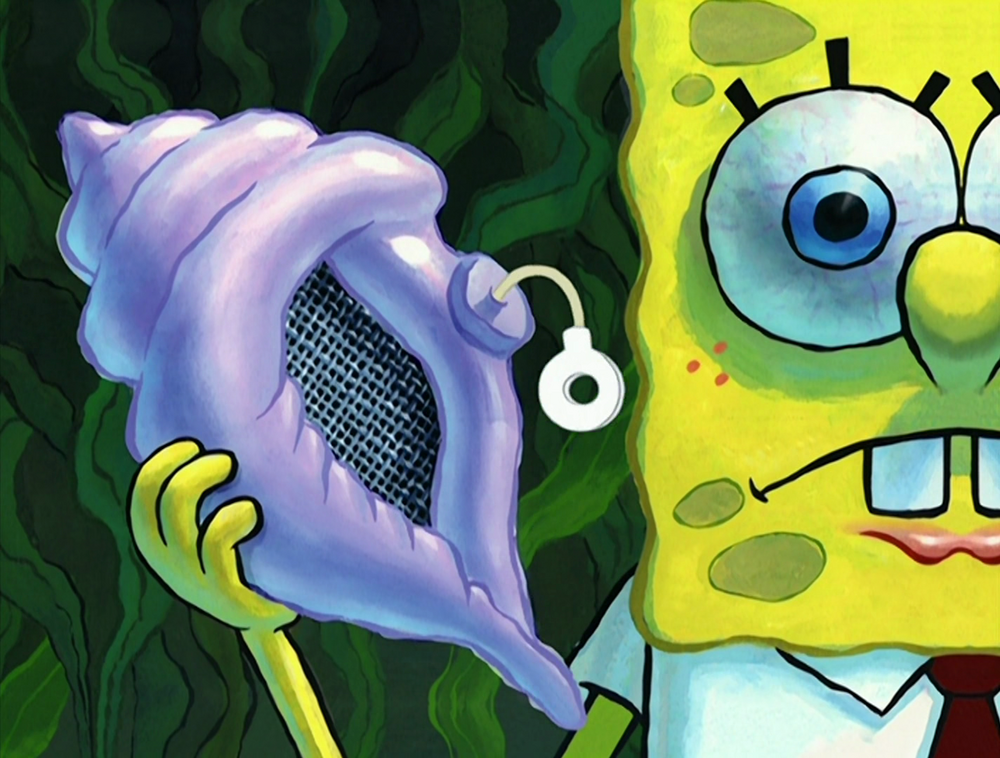
Why does this story keep happening? What does it say about Squidward, who is so committed to his persona that he can only transgress its mandates in private? What does it say about the world, that keeps clocking him on it and humiliating him for it?
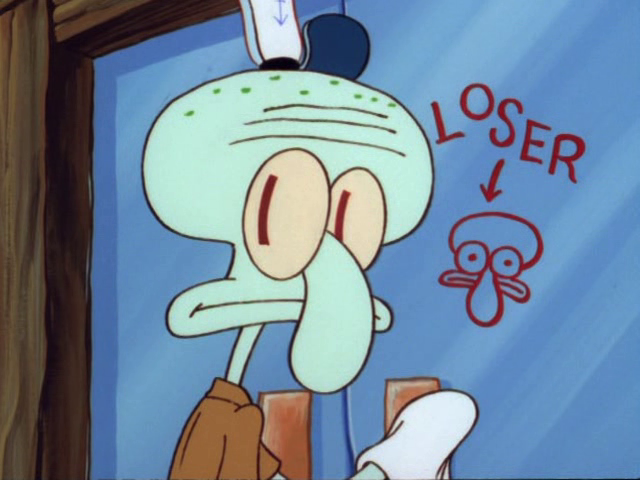
I wrote a more detailed analysis of each episode and how it relates to Squidward:
- Commentary: Bubblestand
- Commentary: The Paper
- Commentary: Artist Unknown
- Commentary: Just One Bite
- Commentary: Idiot Box
- Commentary: Club SpongeBob
Of course, there must be more than just these. I'm sure you could find examples from season four and beyond, but by that time the creators had built the characters and situations, wound them up, and set them down; and away they went cluttering like hey-go-mad, treading the same steps over and over again, until they made a road of it, as plain and smooth as a garden-walk. It would be surprising if SpongeBob and Squidward didn't go on doing the same bit. So I'm not going to write about them unless they reveal a new dimension to the Squidward/SpongeBob dynamic.
On the other hand, there are some wonderful episodes that don't fit this formula at all. I certainly hope to analyze some of the episodes where Squidward gets exactly what he wants, and hates it. I also want to look at episodes like “Pizza Delivery” and “Fools in April,” which have their own memorable Squidward arcs. But these will have to wait for a later post.
